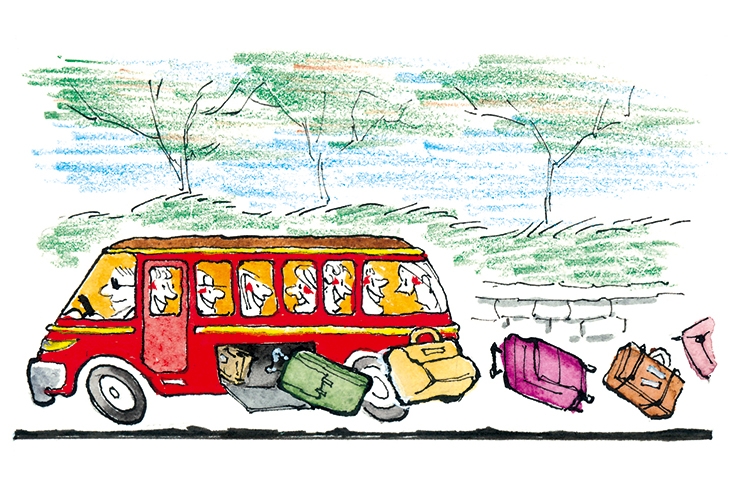Goodnight, Caecilius. Goodnight, Metella. Farewell, faithful Cerberus the dog. What a fate. Buried under the ash and rock at Pompeii. ‘Eheu,’ as they say in the Cambridge Latin Course. ‘Oh dear, oh no.’
But what’s this? A boat leaving the Bay of Naples… A young man on board… Coughing black dust, but… alive. Yes, it’s Quintus, sailing to safety and Book Two. Here we will learn about Quintus’s further adventures in Roman Britain, trips to the baths at Aquae Sulis and an audience with good King Cogidubnus.
What fun we had with Caecilius and Co. What bread, what circuses. What larks with Grumio and Clemens, the two buffoonish slaves. Parents who were taught classics by Loeb and Liddell & Scott looked down on the Cambridge Latin Course. Graphic novels with added gerunds.
But if you learnt Porto, Portas, Portat on the mean streets of Pompeii, then the words ‘Caecilius est in horto’ will give you a thrill. It seemed only a short leap from ‘Servus est in atrio, Servus in atrio laborat,’ to Horace, Pliny and Ovid. Just a few thousand declensions under my breath at the bus stop… then, Aeneas, here I come.
The Upper Fourth’s week in Naples, Pompeii and Herculaneum wasn’t hell in the usual school trip sense. No one was lost, left behind or eaten by wolves. But it was hot. An Easter inferno, scorching and shadeless. Sun on the stone-baked streets of the two dead cities. Sun on the uphill slopes of Vesuvius. On the boat crossing to Capri. On the platforms of the Circumvesuviana railway.
Each day a heat headache that started at half past 11 and went on, splittingly, until bed. Headaches made worse by a diet of ice cream — ‘un gelato al cioccolato bianco per favore’ remains the only Italian I know — and Limoncello sipped from souvenir bottles bought to take home to parents.
Our hostel bedroom at Vico Equense was a kiln. The one square window had been blocked with an air-conditioning unit. Broken. We lay in bunk beds, the four of us like baking tesserae, gulping Nurofen and fizzy aranciata. Naples was lairier and scarier than any place I’d been before. Stuck in traffic, our coach was surrounded by boys on mopeds jeering and leering and licking the windows. At night they stood at the hostel gates to bay and catcall. We English roses had never seen anything like it. The teenage boys I knew looked at their feet while they told you, level by level, how they had conquered ‘Tomb Raider’. The red-blooded, black-eyed Neapolitan ragazzi were, to me, a sheltered 13-year-old, terrifying.
The day we went to Pompeii we were told to walk in fours. Around midday (mad dogs and English schoolgirls…) a friend and I were separated from our group. We wandered off the main drag. Shadier, here. A group of boys began to follow us. ‘Inglese, Inglese,’ they called. We walked more briskly. ‘Inglese, Inglese.’ When we wouldn’t turn, one of them threw a rock at us. Another. And another. One hit the back of my head. I saw stars. Stellae, stellarum, stellis…
After that they scarpered. I still remember the pain, a crashing chord above the headache bass. My friend got me to the cafeteria where I slept all afternoon, slumped on a table. Concussion by a genuine bit of first-century archaeology.
What shocked me wasn’t so much the blow, or the bruise the next day, but the thought, realised for the first time, that a man who didn’t get what he wanted from a woman could behave badly. My father, my brother, my peerless Latin teacher Mr Barron, did not throw rocks at young women. I had assumed no man would.
It wasn’t until I read Elena Ferrante a year ago that I understood that all Neapolitan boys throw rocks. It’s like flowers or chocolates. Rock-lobbing is the sexting of the south. ‘Throwing stones was the norm,’ says Lenù, the narrator of My Brilliant Friend, the first of Ferrante’s Neapolitan Quartet. After school, a gang of boys led by Enzo, son of the fruit-and-vegetable seller, start to throw rocks from a railroad embankment at Lenù and Lila. The difference is that, in Ferrante, the girls throw back. A flat, jagged stone cuts Enzo’s calf like a razor. He hurls one last missile — and strikes Lila’s forehead. ‘I feel no nostalgia for our childhood,’ says Lenù. ‘It was full of violence.’
I got off lightly. No harm done. On my feet for the wildflowers at Paestum and the Villa Poppaea. Back in England at the start of the summer term, I felt a great deal more fondly towards the nation’s shy Tomb Raiders.







Comments